
USDA
The U.S. Department of Agriculture (USDA) oversees meat, poultry, and egg products, accounting for 20 percent or less of the food supply. The majority of the food supply (80 percent or more) is regulated by FDA. USDA's Food Safety and Inspection Service (FSIS) ensures that the U.S. meat, poultry, and processed egg supply is safe and properly labeled.
Articles
More ArticlesPodcasts
More PodcastsNever miss the latest news and trends driving the food safety industry
eNewsletter | Website | eMagazine
JOIN TODAY!Copyright ©2025. All Rights Reserved BNP Media.
Design, CMS, Hosting & Web Development :: ePublishing



